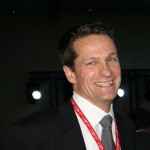 Last week I was so fortunate as to preside as the President of the Selection Jury for the 2009 Eurecan European Venture Awards. I sat-in on many of the presentations as 25 of the finalists pitched their business plans to investors and industry experts. I was struck by how good so many of these entrepreneurs really are. I was impressed with their passion, their commitment and their dedication to a dream of creating a successful business.
Last week I was so fortunate as to preside as the President of the Selection Jury for the 2009 Eurecan European Venture Awards. I sat-in on many of the presentations as 25 of the finalists pitched their business plans to investors and industry experts. I was struck by how good so many of these entrepreneurs really are. I was impressed with their passion, their commitment and their dedication to a dream of creating a successful business. If you are an entrepreneur, then be bold. Don’t settle for a safe and easy startup. They usually die. Don’t be afraid to tackle the impossible and attempt to change the world. We need more people like you.
In my training as an executive coach, I was taught to ask empowering questions. I think that one of the toughest questions to answer is the following:
"What would you attempt to do if you knew you would not fail?”
Often when I try to answer this question, I end up answering it based on what is realistic. My answers are usually determined by what is practical or do-able based on where I am now. In relation to the development of my own startup business, I tend to try to work out in my mind what I think is achievable, starting from the present moment and moving forward in small steps. The reason why this question is so difficult and yet also so powerful is that it removes the “impossible” part. What would you do if you knew - that no matter what you attempted – that you would be successful? Think about this for a moment.
Are you doing your job because it is easy and convenient? Are you going through life in a routine or are you truly questioning what is possible, pushing the limits and challenging yourself? How bold is your work and your life?
_______________________________________________________
The entrepreneurs that presented at the 2009 Finals of the European Venture Awards were bold. I applaud them for their guts, their determination and their perseverance.
p.s., There were four technology tracks in the competition (2 for ICT, cleantech and life sciences) and a best elevator pitch award. The winners were:
- Life Sciences - Biomodics (DK) - A fantastic catheter invention that can save millions of lives each year from unnecessary hospital infections. (see www.biomodics.com). This company was voted the overall 2009 winner. Congratulations to Peter Thomsen! Great product and excellent company.
- Cleantech - Ash Dec (AS) - A unique environmental system that can generate energy and recover phosphates (an inorganic chemical that is limited and essential to life on earth) from from waste (see www.ashdec.com). This product really opened my eyes to the importance of phosphates to our planet. CEO is Ludwig Hermansen.
- ICT 1 - Liquivista (NL) - Electrowetting displays reduce power consumption and increase readability for electronic devices. These displays may replace LCD panels someday and show up in mobile phones, cameras, iPods and all other types of devices. (see www.liquavista.com) The CEO is John Feenstra. Great technology!
- ICT2 - Softkinetic (NL) - This company was one of my favorites because I am an IT software geek at heart. It is a developer kit and programming environment for 3D cameras allowing software producers to create games, interactive digital entertainment, interactive marketing and consumer electronics. This allows you to play like with the Wii2, only without any hand-held devices. Check out the videos on their website. (see www.softkinetic.net). CEO is Michel Tombroff. Watch this company. They will do well.
- The Best Elevator Pitch Award went to: Agnitio (ES) - Ms. Sapna Capoor - which is a company that has developed voice recognition technologies for forensics, law enforcement and intelligence needs. They already have the US Homeland Security organizations as clients and are some of the world's leading experts in their growing field.
Want to turn-around your business and achieve results in record time? Contact me to discuss Executive Coaching, Group Facilitation and Management for Hire services for technology companies. You can learn more at www.ricksalmon.com and at www.xelerator.com.
Rick Salmon is an energetic entrepreneur who believes that this beautiful world that we have created needs our help. Subscribe to this newsletter/blog to receive frequent updates and tips.
























